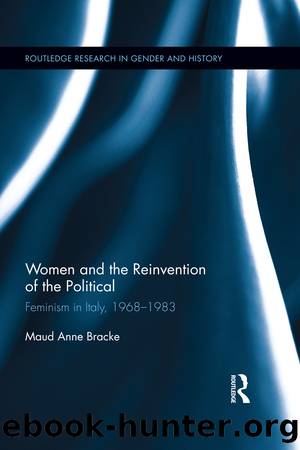Women and the Reinvention of the Political by Maud Anne Bracke

Author:Maud Anne Bracke [Bracke, Maud Anne]
Language: eng
Format: epub
Tags: History, Modern, 20th Century, Europe, Italy, Western
ISBN: 9781317674122
Google: A-wABAAAQBAJ
Publisher: Routledge
Published: 2014-07-11T16:05:42+00:00
5
Work, or the Question That Never Went Away
Trade Union Feminism in Turin
1. Challenging the âIdeology of Labourâ
During the âeconomic miracle,â Turin was transformed from a somewhat peripheral city to a pillar of the national economy. It was home to one of Europeâs largest industrial complexes and Italyâs main private employer: Fiat car manufacturing. In the mid-1970s, Mirafiori alone, the largest of the Fiat plants, employed more than sixty thousand workers, making it the single largest factory in Western Europe at the time. Immigration to Turin was larger than to any other Italian city, as its number of inhabitants rose from 753,000 in 1953 to around one million in 1961.1 Initially, the âDetroit of Italyâ was ill equipped to host the thousands of southern Italian immigrants disembarking daily from the Treno del sole, or those arriving from Istria or the Piedmontese countryside. More so than the other major cities, Turin had to reinvent itself, facing a new set of social problems, including housing shortages and inadequate social services. There was, in addition, systematic discrimination against southerners in education and housing, and widespread prejudice against them that amounted to a form of racialisation.2 As a result of social tensions, Turin was an epicentre of the Hot Autumn of 1969. Although not entirely a âsouthernersâ revolt,â southern workers were central to the specifically Torinese workplace radicalism, which was, at least initially, unorganised and uncontrolled by the unions. The extra-parliamentary groups, influential here in the factories, interpreted and celebrated the factory revolt not only as a return to the cityâs historical radicalism (the factory council movement of the early twentieth century) but also as a signal of the end of the Torinese working classâs obedience to the parties of the traditional Left (the PCI and the PSI) and the major trade unions (the CGIL, the CISL and the UIL). Such obedience was contrasted with the radicalism of the male southern worker, presented as the new revolutionary.3 His supposedly innate, spontaneous radicalism was romanticised, in an image that was explicitly gendered. It was a particular embodiment of the new male heroism discussed in Chapter 2. Such discourses contributed to a hypermasculine politics emerging in the context of 1969 in industrial cities such as Turin, creating specific challenges for feminists.
There was an element of truth in the image of the disciplined Torinese working class. Here, the allegiance to the workersâ movement felt among industrial workers was a deeply instilled one, as was a collective identity based on waged industrial work. In Fascism in Popular Memory, Luisa Passerini traces elements of working-class culture in Turin and Piedmont from the late nineteenth to the mid-twentieth centuries and identifies the place of work in womenâs and menâs subjectivity. While elements such as craftsman-ship, pride and the ability to âmake doâ were characteristic of traditional Piedmontese male work identity, such elements after 1945 lived in tension with rebellion and the refusal to work. Womenâs work identities, Passerini proposes, underwent an opposite development, from the non-centrality of work to womenâs sense
Download
This site does not store any files on its server. We only index and link to content provided by other sites. Please contact the content providers to delete copyright contents if any and email us, we'll remove relevant links or contents immediately.
american english file 1 student book 3rd edition by Unknown(609)
Phoenicians among Others: Why Migrants Mattered in the Ancient Mediterranean by Denise Demetriou(608)
Verus Israel: Study of the Relations Between Christians and Jews in the Roman Empire, AD 135-425 by Marcel Simon(595)
Caesar Rules: The Emperor in the Changing Roman World (c. 50 BC â AD 565) by Olivier Hekster(580)
Basic japanese A grammar and workbook by Unknown(575)
Europe, Strategy and Armed Forces by Sven Biscop Jo Coelmont(520)
Give Me Liberty, Seventh Edition by Foner Eric & DuVal Kathleen & McGirr Lisa(497)
Banned in the U.S.A. : A Reference Guide to Book Censorship in Schools and Public Libraries by Herbert N. Foerstel(492)
The Roman World 44 BC-AD 180 by Martin Goodman(478)
Reading Colonial Japan by Mason Michele;Lee Helen;(469)
DS001-THE MAN OF BRONZE by J.R.A(462)
The Dangerous Life and Ideas of Diogenes the Cynic by Jean-Manuel Roubineau(456)
Introducing Christian Ethics by Samuel Wells and Ben Quash with Rebekah Eklund(456)
Imperial Rome AD 193 - 284 by Ando Clifford(454)
The Oxford History of World War II by Richard Overy(454)
Catiline by Henrik Ibsen--Delphi Classics (Illustrated) by Henrik Ibsen(427)
Language Hacking Mandarin by Benny Lewis & Dr. Licheng Gu(411)
Literary Mathematics by Michael Gavin;(407)
Brand by Henrik Ibsen--Delphi Classics (Illustrated) by Henrik Ibsen(390)
